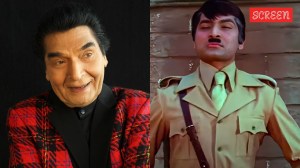Woods reveals rare fallibility during glorious year
LONDON, December 25: He drives a golf ball impossible distances, possesses a smile slightly more dazzling than the sun, amasses riches as ...

LONDON, December 25: He drives a golf ball impossible distances, possesses a smile slightly more dazzling than the sun, amasses riches as easily as Bill Gates and reveres his parents.
Yet even Tiger Woods, most people’s choice as athlete of the year 2000, is human.
In London’s Hyde Park last month the Tiger strove in vain to reproduce a television stunt. Six times he juggled a ball at the end of his iron and tried to hit it in to the stratosphere. Six times he failed. "I guess I just suck," Woods muttered.
Little else in an astonishing year yielded even a hint of mortality. Woods joined Ben Hogan as the only man to win three majors in a season. He won nine U.S. titles, the most since Sam Snead 50 years ago. His material reward was a record $9,000,000 Tour prize money.
After Fiji’s Vijay Singh won the U.S. Masters, the year belonged to Woods.He touched perfection in winning the U.S. Open by a record 15 strokes and the British Open by eight, the latter in a record 19-under-par. Then to prove he could still win when not at his transcendent best, Woods beat Bob Mays in a three-hole playoff of escalating and grinding tension to retain the U.S. PGA.
Eerie skill allied to the studied calm of a Zen master was accompanied by a keen sense of his commercial worth. Woods asked unsuccessfully for money to play in the Ryder Cup and suggested that the U.S. Tour should pay more for using his image in its promotions.
Similar demands by Richard Williams, father of Venus and Serena, disturbed the sisters’ rivals on the women’s tennis tour. Richard Williams said his daughters generated higher television ratings and revenue than other players and were therefore entitled to a bigger slice of the pie.
Whatever the right and wrongs of each case, Woods, of mixed race, and Venus Williams, the first black Wimbledon champion since the late Arthur Ashe in 1975, did extend appreciation of their sports in the United States beyond the traditional middle class enclaves.
Venus beat little sister Serena in an anti-climatic Wimbledon semifinal then defeated defending champion Lindsay Davenport in the final. Her father added an unnecessary embellishment by holding up hand-lettered signs including "IT’S VENUS’S PARTY AND NO ONE WAS INVITED!"
The contrast with Pete Sampras, who won a record 13th Grand Slam title on the Wimbledon grass, could not have been greater. Sampras refuses to pander to those who demand show business with their sport, remaining content to display unequalled excellence based on a precise and deadly serve coupled with all-round athleticism. He defeated Australian Pat Rafter in four sets, watched by parents who steadfastly avoided the media.
Venus Williams travelled to Sydney for the Olympics, winning the singles title and sharing the doubles with Serena, at a Games which proved a triumph for a vibrant, confident nation rightly celebrated for its sporting prowess.
The venues were spectacular, the crowds appreciative and knowledgable and local heroes Cathy Freeman and Ian Thorpe duly delivered. Freeman lit the Olympic flame, in a somewhat obvious symbol of reconciliation between the native aborigines and the European settlers. Clad in a futuristic running suit, she then won the 400 metres gold medal in the mysterious absence of her main rival Marie-Jose Perec who had fled to her native France.
Thorpe, 17, won three golds and two silvers in the pool, breaking three world records en route, although Australian celebrations were muted by his loss to Dutchman Pieter van den Hoogenband in the 200 metres freestyle.
Van den Hoogenband set world records in the 100 and 200 freestyle while his female compatriot Inge de Bruin set three on the way to the 50 and 100 metres freestyle titles and the 100 metres butterfly.
On the track, Marion Jones fell short of her ambitious target of five gold medals, winning the 100-200 metres double but finishing with a bronze in the long jump and the 4X100 relay. Jones, who had to cope with the unwelcome pressure of a positive drugs test for her husband C.J. Hunter, then showed the mental strength of a true champion with a blazing third leg for the winning U.S. 4×400 metres relay team.
The track race of the Games, and one of the greatest ever ATA major championships, came in the 10,000 metres where Ethiopian Haile Gebrselassie, his usual serene smile replaced by an agonised grimace, caught Paul Tergat on the line to win by nine-hundredths of a second.
Drugs provided a dark sub-plot again to the Games with four weightlifters stripped of their medals, further undermining the sport’s credibility.But none of the Olympic drugs positives, nor the belated admission by Richard Virenque that he had taken drugs in the infamous 1998 Tour de France, could match the shock waves created by the cricket match-fixing scandal.
Disbelief was succeeded by dismay after reports that South Africa’s captain Hansie Cronje, previously viewed as a figure of unbending rectitude, had taken money from bookmakers.
By the end of the year after separate inquiries in South Africa, Pakistan and India, Cronje and two other former test skippers, Salim Malik of Pakistan and Mohammad Azharuddin from India had been banned for life in connection with match-fixing.
Inevitably over-shadowed by the biggest crisis to hit the summer sport of the British commonwealth, Jamaican fast bowler Courtney Walsh became history’s leading Test wicket-taker and Steve Waugh led Australia to a record 12 Test victories in a row.
Australia also won the rugby league World Cup and retained the rugby Union Bledisloe Cup against New Zealand after two matches which elevated the game to a new dimension.
The overall Australian sporting prowess is rivalled on a per capita basis by France who won an entertaining European soccer championship to add to their 1998 World Cup.
Zinedine Zidane, named world Player of the Year, was the player of the tournament staged in the Netherlands and Belgium, although the golden goal 2-1 victory over Italy in the final came courtesy of two substitutes in injury time.
The New York Yankees, while not the force of two years ago, remained one of the world’s most ruthless sporting dynasties, winning the subway World Series against the Mets.
Michael Schumacher won Formula One’s world drivers’ title, the first for Ferrari since 21 years, after a gripping duel with Mika Hakkinen in his McLaren while Lance Armstrong won the Tour de France for a second year in a row.
Woods, Sampras, Zidane, Schumacher and Armstrong would have been champions in any era. But the jury in the United States still seems to be out on Britain’s world heavyweight boxing champion Lennox Lewis. Lewis disposed of Michael Grant, Frans Botha and David Tua and few neutrals doubted he would beat Mike Tyson, who continued to self-destruct in and out of the ring.
Maybe Lewis’s problem, if it is a problem, is to treat boxing as a science rather than legalised mayhem. In this, like Sampras, he is going against the spirit of the age which craves endless sensation at the expense of substance.





- 01
- 02
- 03
- 04
- 05


























